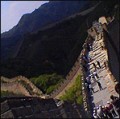::: The East, The Wall, The Sun

“A manager is someone who is never late, keeps track of time, knows more than he seems to, never takes action beyond his knowledge and salutes the end from the outset.”
This documentary project featuring the culture of management and cultural management examines the mutual ties between the two civilizations of Iran and China throughout history.
The East, the Wall, the Sun tells of cultural reproduction and tries to examine the use of tradition in modern management; for example, the fact that why Confucian ethics and philosophy were the basis of Chinese old management system and that why modern China is taking advantage of Taoism, Confucian philosophy and Communist China’s administrative management course for managing contemporary China.
This documentary expresses the possibility of reproducing the past in Iran in comparison to China and as an example of this past it makes mention of Sa’di, the world-famous 12th-century Iranian poet.
Sa’di was a contemporary of Confucius. Being an avid traveler and having viewed people’s relations he had a variety of suggestions for people and managers to help them better manage their own and other people’s lives.
In The East, the Wall, the Sun an Iranian researcher travels to China to track the effect of Persian managers and thinkers in the history of China and in the halcyon days of the Silk Road. He goes along the Silk Road and travels into the heart of history in order to get to know a Persian thinker called Seyyed Ajal Shamseddin Bokhara’ee, the premier in the court of Kublai Khan (contemporary with Marco Polo’s trip to China) and the grand vizier in the court of Yen.
In this documentary, Seyyed Ajal represents a successful Persian manager who has managed to find a creditable stance in a foreign culture through cultural awareness and leave behind positive influences.
Besides preserving Seyyed Ajal’s resting place in contemporary China, the Chinese have also built a memorial in Kunming (the center of China’s largest southern province bordering Vietnam) to commemorate this eminent Persian thinker.










